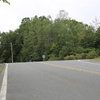Informational meetings seek to avoid a second Westerlo bond defeat
The Enterprise — Tim Tulloch
“And right here…” Town residents follow along on their copies of a proposed floor plan as Delaware Engineering designer Brad Burgett walks them through the proposed reconfiguration and helps them to visualize how a modernized town hall would function. Resident Dianne Sefcik, left, recorded video of the tour.
WESTERLO — Plans for a wholesale renovation of the town hall got a further public airing Thursday in advance of the do-or-die permissive referendum on the Nov. 8 ballot that will ask voters to approve borrowing up to $887,000, to finance the redo, as authorized by the town board at its September meeting.
An informational tour of the building — led by a representative of Delaware Engineering, the Albany firm responsible for the renovation plan — was followed by a pointed but civil question-and-answer session. A small group of residents — eight to be precise — got to fire a wide range of questions and suggestions at the town board, the tour guide, and the building committee, which is composed of the town board members plus two residents.
The 67-year-old brick building — formerly an elementary school many town residents fondly remember attending — was acquired by the town in 2010, using grant money. Few alterations to the building have been made since then. Basketball hoops still hang in the big former assembly and gym space where the town board meets; chainlink still protects its tall windows from errant basketballs, and acoustics are poor. Drinking fountains remain the perfect height for grade-school children. In winter months, old radiators — parts for them are no longer available — groan. Former classrooms have been awkwardly subdivided.
The heating system is the original one. A steep stairway leads to the basement and its giant boiler and old archives.
Three town functions — town court, records storage, and the State Police substation — had to be left behind when town government, in 2012, moved into the former school from its old quarters in the deteriorating highway garage building. The renovation plan calls for rehousing all three activities in a modernized town hall that would be reconfigured to provide as well better work spaces for town offices and employees already there.
Last year, Westerlo citizens petitioned to force a public vote on a $2.75 million bond that would have upgraded the town hall and built a new highway garage at an estimated annual cost to the taxpayers of $99 for the life of the bond; the measure was defeated, 341 to 162.
What about....?
Asked after the question session if the grilling he had received had been unusual or was typical of taxpayer-financed projects, Brad Burgett, the Delaware Engineering point man on the project and tour guide, said it was pretty typical.
His firm works primarily with municipalities. Its portfolio of completed projects includes a series of building renovations for the city of Norwich.
One theme that questioners returned to several times was why the public cannot get a breakdown of costs — the estimates prepared by Delaware Engineering for all the components of the project — rather than just a bottom line total.
Burgett said such a breakdown would be illegal in a public project such as this because no disclosure of line-by-line estimates to either the public or to bidders can occur before the project is bid and competing bids are submitted. Town officials have repeatedly said that once all bids are received, the project could well cost below $887,000.
Bichteman told the gathering that grant opportunities will be pursued to help fund the project but that can’t happen until cost breakdowns can be made public.
A resident who said he was a contractor cited the current SUNY Polytechnic uproar as an example of an illegal bidding process in taxpayer-funded projects. “You can’t reveal costs, “ he said.
Bidding on the project will happen only if the bond gets a green light from voters Nov. 8.
Councilman and Building Committee Chairman Bill Bichteman — himself a retired contractor — said, “We [the town] will decide to go forward only after bids are received….We can stop the project anytime we want.”
Town resident Leonard Laub said that, although current cost estimates can’t be made public, what about a “list of what’s to be done...a very broad summary, a statement of work...the requests for proposals.”
He said he was making his appeal for more information “for your benefit,” as a way to increase public support before the referendum.
Burgett said that such documentation might run as long as 20 pages but could be done. Response to Laub’s proposal from the building committee at the front of the room seemed positive.
Asked after the meeting how such a mass of information might be conveyed to the public, Bichteman said he wasn’t sure, but that the town website might be one option. Later, he told The Enterprise that he hopes the bid sheet — a comprehensive multi-page list of all the work to be done — may satisfy those project critics still looking for more information, but it may not. He said that the amount of project information that has been made available before the coming referendum is already much greater than was communicated before the Sept. 2015 referendum
Big issues, small details
Town resident Dianne Sefcik has been a long-time critic of the project while conceding that the building “needs work. ” She said Thursday that the project has moved forward with too little public input and too little transparency.
Meetings of the building committee were open to the public but not to public participation. Bichteman told The Enterprise that after initial meetings in which the public had its say, it became clear that the work of the committee would be too slowed by public comment, which could be made in other ways outside the meeting.
Sefcik also questioned, as she has in the past, why the town seems so married to Delaware Engineering.
“If I were building a house,” she said, “I wouldn’t talk to just one contractor.”
The town has been working with the firm for two years now. The defeated September 2015 $2.75 million bond issue was also based on a proposal from Delaware Engineering
The $887,000 in borrowing town voters are being asked to approve this year does not include, as the 2015 one did, a new highway garage. Bichteman has said he believes needed repairs to the highway garage can be postponed. Sefcik and others have expressed concerns that town residents may be hit with a big bill down the road for work on the garage.
Residents, including Sefcik, also continue to question whether the building committee adequately looked at other options. Bichteman assured her it had. Burgett said the option of building a new town hall had been examined and would far outstrip the cost of renovating the existing town hall.
Other questions got down to brass tracks — the details of the plan as explained in the tour — questions, in fact, much like those a homeowner might ask of an architect. Some had to do with traffic flow, others with details like how far the ceiling would be lowered in the assembly room (not enough to cover at all the big room’s tall windows, was the answer).
Full-court press
Stung by defeat last year, the town is trying to get the word out to town residents and businesses to make sure they know what their money will buy and how much it will cost them.
The town’s informational flyer says that at current low interest rates the average resident will pay $32.11 more per year over the 20-year term of the proposed bond; commercial properties, $32.11; and industrial — the town is home to manufacturer Hannay Reels — $141.89.
In addition to a more functional floor plan, the town says, the renovation will deliver — among other things — a new heating system and insulation that will meet New York State Energy code requirements; new restrooms and access updates for conformance with the American Disabilities Act; exterior work to improve traffic flow as well as safety, lighting, and parking; asbestos removal on the main floor; and energy-efficient lighting. Utility costs will be reduced, the town promises. The exterior appearance of the building will be preserved and needed repairs made.
In one of the the informational meeting’s more relaxed moments, a resident asked about future placement of the town hall’s traditional Christmas tree which used to be placed on the assembly room stage, an area slated to house file storage.
Town Supervisor Richard Rapp said after the meeting that he looks forward to the transfer of the safe — which he says he discovered in a hayloft many years ago — to the renovated town hall from the highway garage. Rapp carried the keys on the tour, opened locked doors, and answered questions about the town files and archives during the questions session. Rapp has been town supervisor for almost four decades.
He may be be looking forward also to having an actual office in the updated town hall. Right now he sits behind a desk in one corner of the main classroom.
Bichteman said if the referendum passes, the contractor who wins the job would be required to complete the work within four months. While the work is done, everybody in town hall would move temporarily back to the highway garage.
Another informational meeting is scheduled for Saturday, Oct. 15 at 1:30 p.m., to be preceded by a half-hour tour of the building. Bichteman said the bid sheet might be made available at that event, for which he is hoping the turnout is much better than Thursday’s.


